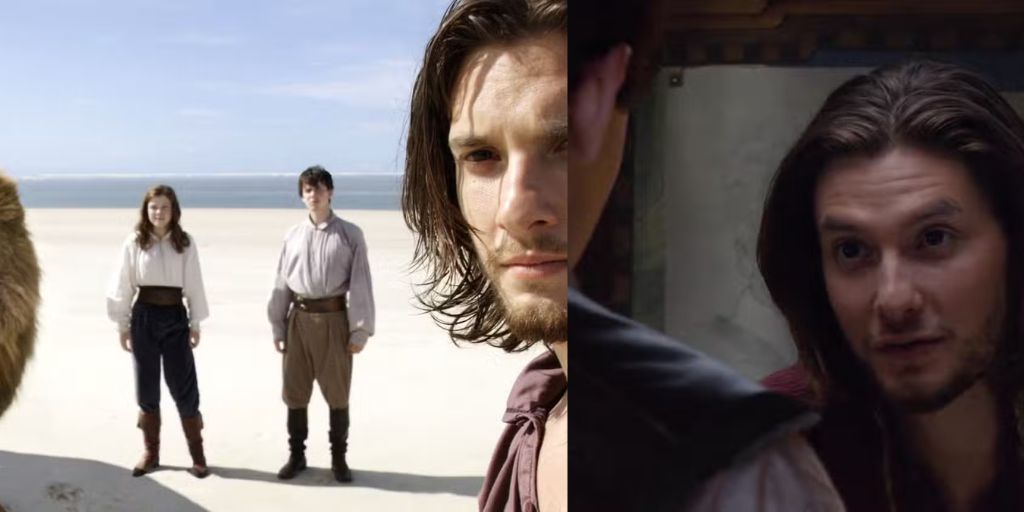The Chronicles of Narnia films brought C.S. Lewis’ beloved books to life, but they did not last long enough. Only three of the seven books were turned into movies before the series stopped. The first film, The Lion, the Witch and the Wardrobe, was a great success, but interest in the series declined with each new movie.
Like all adaptations, the movies made changes to the original books. Some changes were small, while others were much bigger. Among all the films, Prince Caspian made the most changes.
This second film tells the story of Prince Caspian, a young man from the Telmarine royal family. Even though the Telmarines had conquered Narnia and ruled over it, Caspian chose to defend the native Narnians who had been displaced.
The movie added extra battle scenes, created a romance between Caspian (Ben Barnes) and Susan (Anna Popplewell), and showed Miraz (Sergio Castellitto) openly admitting that he killed his own brother. These were big changes from the book, but one small change caused an unexpected issue—the Telmarines’ accents.
Also Read: ‘1923’ Season 2 Episode 5 Recap: Dramatic Turns and Unexpected Dangers in Episode 5
Caspian’s Accent Creates Inconsistencies in The Chronicles of Narnia
The filmmakers decided to give the Telmarines Spanish accents to separate them from the native Narnians. This was not just a coincidence. Ben Barnes, who played Prince Caspian, was asked to use a Spanish accent, showing that this choice was intentional.
However, there was no clear reason why this specific accent was necessary. The filmmakers may have wanted to connect the Telmarines to Spanish conquistadors, who were known for conquering lands. However, this connection was not essential because the movie already made it clear that the Telmarines were invaders.
If the goal was to make the Telmarines feel distinct, it would have made sense to hire actors who naturally spoke with Spanish accents. Instead, actors had to change their accents for the role, making it seem like a forced choice. Despite this, Prince Caspian kept the accent for the entire film.
The real problem came in the third movie, The Voyage of the Dawn Treader, when Caspian’s accent suddenly disappeared. In this film, Caspian speaks with Ben Barnes’ natural English accent, and the movie never explains why.
A lot changed between Prince Caspian and Voyage of the Dawn Treader. The production company was different, and the creative team made various new choices. However, the sudden loss of Caspian’s accent stood out because it was so noticeable. It left fans wondering why the change happened and whether it was a mistake or a planned decision.
Ben Barnes Defended Caspian’s Original Accent
Ben Barnes spoke about this change in a 2020 live stream with NarniaWeb. He explained that the new director of Voyage of the Dawn Treader, Michael Apted, decided that the Telmarines no longer needed to have an accent. Barnes recalled, “After the second film, a new director took over and said, ‘I don’t think the Telmarines need to speak with that accent, so maybe just use your own accent.'”
From a practical standpoint, this reasoning makes sense. The accents in Prince Caspian did not serve a strong purpose, and by Voyage of the Dawn Treader, most of the Telmarines were no longer in the story. Keeping the accent might have made things more complicated. However, since Caspian’s accent was already established, removing it without explanation made the transition feel awkward.
Even Barnes disagreed with the decision. He told NarniaWeb, “Let it be known for the record that I did fight tooth and nail to keep the accent because I said, ‘Well, we’ve started with it, so we can’t just drop it now. It’s about the character.'” Barnes believed that since Caspian had used the accent before, it was important to keep it. However, despite his efforts, the creative team ultimately removed it for the third movie.
For many fans, this change was more distracting than the accent itself. Some viewers had accepted Caspian’s Spanish accent in Prince Caspian, even if it felt unnatural. But removing the accent entirely in the next film made the character feel different.
Was Dropping the Accent a Mistake or a Creative Choice?
The filmmakers did not forget about the accent. Instead, they made an intentional decision to remove it. There is no official statement explaining why, but Barnes’ interview gives some insight.
Additionally, IMDb addresses the change in its “incorrectly regarded as goofs” section. It states, “This is done purposefully by the filmmakers, who no longer needed to match Caspian’s accent to the other Telmarines.”
IMDb also provides an in-universe explanation, saying that people’s accents can change over time. While accents do evolve, Caspian’s case is unusual. The time jump between Prince Caspian and Voyage of the Dawn Treader is only three years, which is not long enough for someone to completely lose their accent.
Normally, accents change gradually when people are immersed in a new environment for many years. Since Caspian was still ruling Narnia and surrounded by the same people, his accent change does not feel natural.
Did the Accent Change Actually Help the Character?
Despite the inconsistency, some people believe the change makes sense for Caspian’s story. In Prince Caspian, he is a young prince from the Telmarine ruling family. In Voyage of the Dawn Treader, he has fully embraced his role as the King of Narnia. He is no longer just a Telmarine—he is the leader of all Narnians. His English accent in the third film could symbolize this transformation, even if it was not an intentional metaphor.

However, for many fans, this reasoning does not make up for the inconsistency. Caspian’s character development was already clear through the story, so his accent change only made things more confusing.
What Can Future Narnia Adaptations Learn From This?
Caspian’s shifting accent is a small issue in an otherwise well-loved fantasy series. It does not change the main story, and many viewers did not mind it. However, it does highlight a problem that filmmakers should avoid in future adaptations. When a character is introduced with a specific speech pattern, removing or changing it without explanation can be distracting.
Greta Gerwig is directing a new Narnia adaptation, and fans have high expectations. This upcoming version has the chance to fix past mistakes and create a more consistent experience. If Gerwig’s team decides to use accents to differentiate cultures, they should stick with that choice throughout the series. Whether or not Caspian has an accent in the new films, keeping character details consistent will help make the story feel more natural.
For now, fans can still enjoy Prince Caspian and Voyage of the Dawn Treader on Disney+, even if they notice the odd change in Caspian’s voice.
Also Read: ‘Tracker’ Season 2 Episode 14 Recap: Dark Magic, Missing Kids, and a Deadly Secret




